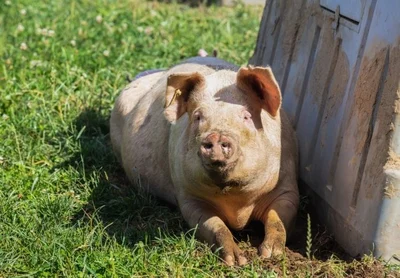Pork industry fears

Canterbury pig farmers want a ban on pork imports as a highly contagious pig disease spreads through Europe.
Dunsandel pig farmer and NZ Pork board member Jason Palmer said local pig farmers were concerned that African Swine Fever (ASF) could make its way to New Zealand through frozen imports.
There was a risk that contaminated food scraps are fed to a backyard population of pigs. From there the virus could spread to wild pigs.
"Then it will be very hard to eradicate."
Palmer said New Zealand's pig stock was one of "cleanest" in the world in terms of being free from most of the pig diseases affecting the global population.
"I think we can do better than we're doing" to protect that, he said.
New Zealand imports 63% of its pork meat from about 19 countries.
There was an on-going concern that the Government was not doing anything about the import of pork products from countries with lower import standards, Palmer said.
"What comes first, protecting New Zealand's disease-free status or trade?"
Last week the NZ Pork board called for a ban on pork imports from countries with ASF infections.
They want the Ministry for Primary Industries (MPI) to temporarily halt the import of pork products from trading partners affected by the virus pending an urgent assessment of those countries’ biosecurity systems.
The call came after several other countries have halted exports after ASF was found in wild boars in Sweden - and warnings from the UK's Department for Environment Food and Rural Affairs that ASF was spreading rapidly through the Balkan states.
NZ Pork chief executive Brent Kleiss said it was concerning that New Zealand continued to accept pork from ASF-infected countries when a number of others countries have halted imports due to the outbreak.
“Armenia, Japan, the Philippines, Singapore, Taiwan and Ukraine, as well as Australia, have all now banned pork imports from Sweden.
“Without swift action, we can expect to see even more Swedish pork entering the New Zealand market."
Pork was arriving in greater volumes from different countries and new diseases had become prevalent since MPI's initial biosecurity assessments. Kleiss said the biosecurity risk had changed in recent years.
An incursion of the virus could devastate New Zealand's pork sector, he said.
MPI's chief veterinary officer Mary van Andel said the most recent detection of ASF was in a very small number of wild boar in Sweden and MPI was actively monitoring the ASF situation.
"We are taking the threat from ASF extremely seriously. Protecting New Zealand from unwanted pests and diseases, including ASF, is our number one priority.
She said commercial pork products could only be imported into New Zealand if they met strict import conditions.
"This required measures to be taken to ensure it is free from ASF."
MPI said all commercial consignments of pork were from ASF-free countries or regions, or had been highly processed to destroy any potential virus.
"We recognise the EU measures to ensure safe trade so haven’t banned for Sweden," van Andel said.
MPI said the highest risk pathway for ASF to New Zealand was through the illegal imports of pork from ASF-affected country via passenger and mail pathways.
Personal consignments of pork through the passenger and mail pathway are not permitted, she said.
African Swine Fever
The virus is highly resistant and can survive in various pork products, including ham, sausages and bacon, as well as on clothes, boots, wheels and other materials.
It can exist for weeks in refrigerated pork, over a year in dried product and indefinitely in frozen pork.
It can spread by air for over two metres between infected and susceptible pigs.
Feeding pigs untreated food scraps that contain or have been in contact with meat is illegal in New Zealand.
Food waste should be heated to 100degC for an hour before feeding to pigs.
Individuals can be fined of up to $5,000 and businesses can be fined up to $15,000 for breaching these feeding regulations.
Sweden accounts for around 6% of imported pork in New Zealand - this was just under 3,000 tonnes in 2022.
In 2022 just under 3,000 tonnes were imported.
By Sharon Davis

